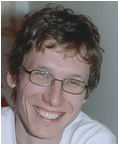Will Braynen: Difference between revisions
From Santa Fe Institute Events Wiki
No edit summary |
No edit summary |
||
| Line 1: | Line 1: | ||
[[Image:WillBraynen.jpg]]<br> | [[Image:WillBraynen.jpg]]<br> | ||
I am a [http://web.arizona.edu/~phil/ Philosophy] PhD student at the [http://www.arizona.edu/ University of Arizona] with a minor in [http://cogsci.web.arizona.edu/index.php Cognitive Science] and previous background in [http://www.cs.sunysb.edu/ Computer Science]. Research-wise, I am currently interested in two things: (1) emergence and stability of cooperative or mutually advantageous behavior and (2) decision-making under risk and uncertainty. In particular, I am interested in the application of these two research areas to questions in political philosophy and philosophy of science. For example, how can the design of social and political institutions solve social dilemmas and when is coercion justified? Or, what principles of justice would we choose if we did not know how wealthy our parents will be and what native abilities we will be lucky to have? These intersect with questions in philosophy of science; for example, what statistical inferences should we draw from our experiences and was Popper right to be an inductive skeptic? From time to time, I also worry about the robustness of computational models. And yes, there is a handful of things I find interesting outside of Geekville too | I am a [http://web.arizona.edu/~phil/ Philosophy] PhD student at the [http://www.arizona.edu/ University of Arizona] with a minor in [http://cogsci.web.arizona.edu/index.php Cognitive Science] and previous background in [http://www.cs.sunysb.edu/ Computer Science]. Research-wise, I am currently interested in two things: (1) emergence and stability of cooperative or mutually advantageous behavior and (2) decision-making under risk and uncertainty. In particular, I am interested in the application of these two research areas to questions in political philosophy and philosophy of science. For example, how can the design of social and political institutions solve social dilemmas and when is coercion justified? Or, what principles of justice would we choose if we did not know how wealthy our parents will be and what native abilities we will be lucky to have? These intersect with questions in philosophy of science; for example, what statistical inferences should we draw from our experiences and was Popper right to be an inductive skeptic? From time to time, I also worry about the robustness of computational models. And yes, there is a handful of things I find interesting outside of Geekville too.<br> | ||
<br> | <br> | ||
wbraynen (at) email (dot) arizona (dot) edu<br> | wbraynen (at) email (dot) arizona (dot) edu<br> | ||
Revision as of 07:27, 1 April 2007

I am a Philosophy PhD student at the University of Arizona with a minor in Cognitive Science and previous background in Computer Science. Research-wise, I am currently interested in two things: (1) emergence and stability of cooperative or mutually advantageous behavior and (2) decision-making under risk and uncertainty. In particular, I am interested in the application of these two research areas to questions in political philosophy and philosophy of science. For example, how can the design of social and political institutions solve social dilemmas and when is coercion justified? Or, what principles of justice would we choose if we did not know how wealthy our parents will be and what native abilities we will be lucky to have? These intersect with questions in philosophy of science; for example, what statistical inferences should we draw from our experiences and was Popper right to be an inductive skeptic? From time to time, I also worry about the robustness of computational models. And yes, there is a handful of things I find interesting outside of Geekville too.
wbraynen (at) email (dot) arizona (dot) edu
